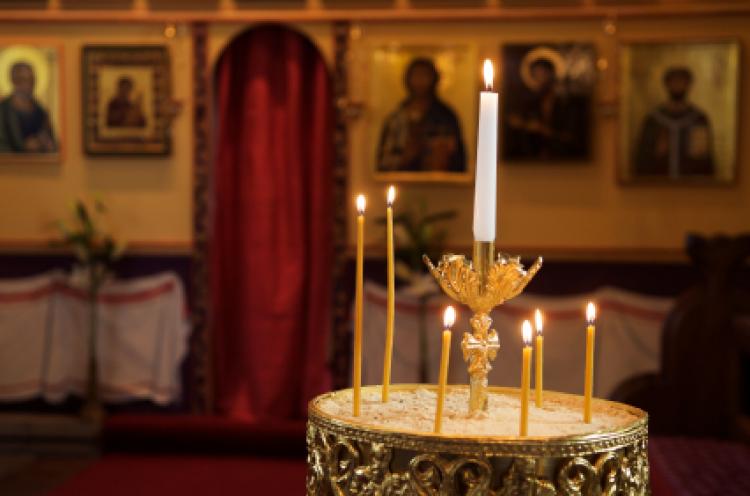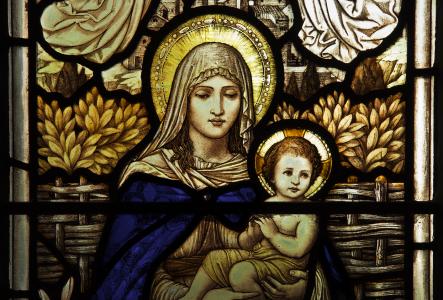
Do You Get a Black Moon?
What is a Black Moon, and why does it happen in December?
Many Orthodox Christians celebrate the New Year with liturgies, blessings or communal meals. The New Year date among Orthodox Christians varies - some celebrate it on the date set by the revised Julian calendar, while others celebrate New Year's Day according to the more traditional Julian calendar.
Orthodox New Year is not a public holiday. Businesses have normal opening hours.

Candles lit in an Orthodox Christian church.
©iStockphoto.com/Lisa Valder
Some Orthodox Christians in the UK mark the start of the new calendar year by attending liturgies to observe the feast of the circumcision of Jesus Christ. Others may attend blessings by well-known figures in the Orthodox Christian Church. Some Orthodox Christians hold communal meals or dinners or parties for family members and friends or set off fireworks.
Some Orthodox churches in the United Kingdom (UK) mark the New Year with the revised Julian calendar, while others use the older version Julian calendar. Orthodox Christians who use the revised Julian calendar mark the start of a new calendar year on January 1 in the Gregorian calendar. Orthodox Christians who use the older version of the Julian calendar mark this occasion on January 14 in the Gregorian calendar.
January 1 is a bank holiday, known as New Year's Day, in the UK. January 14 is not a bank holiday in the UK.
There are many similarities between Orthodox Christians and other Christians in the United Kingdom. They believe that revealed himself in Jesus Christ, in the incarnation of Christ, his crucifixion and resurrection. The Orthodox Church differs, however, from many other UK churches in the way of life and worship.
Some Orthodox Christian churches observe the more traditional Julian calendar while others observe the revised Julian calendar. The older version of the Julian calendar pre-dates the Gregorian calendar, which replaced the Julian calendar in many parts of the world over time. The Orthodox churches continued to use the Julian calendar, until 1923 when a revised Julian calendar, which is more in line with the Gregorian calendar, was created. Some Orthodox Christian groups observe the revised Julian calendar, hence why they observe New Year's Day on January 1 in the Gregorian calendar, while the more Old Calendarists observe New Year's Day on January 14 in the Gregorian calendar.
The start of a new year according to the old or revised Julian calendar should not be confused with the start of a new church year for Orthodox Christians. The Orthodox Christian church year starts on September 1 (revised Julian calendar) or 14 (old Julian calendar) in the Gregorian calendar.
Icons showing images of Jesus' circumcision are symbols of the feast of Jesus Christ's circumcision. These may be displayed prominently in Orthodox churches or during services on New Year's Day.
| Year | Weekday | Date | Name | Holiday Type |
|---|---|---|---|---|
| 2019 | Mon | Jan 14 | Orthodox New Year | Observance, Orthodox |
| 2020 | Tue | Jan 14 | Orthodox New Year | Observance, Orthodox |
| 2021 | Thu | Jan 14 | Orthodox New Year | Observance, Orthodox |
| 2022 | Fri | Jan 14 | Orthodox New Year | Observance, Orthodox |
| 2023 | Sat | Jan 14 | Orthodox New Year | Observance, Orthodox |
| 2024 | Sun | Jan 14 | Orthodox New Year | Observance, Orthodox |
| 2025 | Tue | Jan 14 | Orthodox New Year | Observance, Orthodox |
| 2026 | Wed | Jan 14 | Orthodox New Year | Observance, Orthodox |
| 2027 | Thu | Jan 14 | Orthodox New Year | Observance, Orthodox |
| 2028 | Fri | Jan 14 | Orthodox New Year | Observance, Orthodox |
| 2029 | Sun | Jan 14 | Orthodox New Year | Observance, Orthodox |
While we diligently research and update our holiday dates, some of the information in the table above may be preliminary. If you find an error, please let us know.

What is a Black Moon, and why does it happen in December?

When will the next comet be visible?

Why do mornings keep getting darker after the December solstice?

Orthodox Christians in the United Kingdom celebrate the Nativity of Christ (Jesus' birth) on the Orthodox Christmas Day.